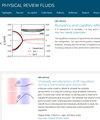Application of large eddy simulation models to electroconvection turbulence study with lattice Boltzmann method
IF 2.5
3区 物理与天体物理
Q2 PHYSICS, FLUIDS & PLASMAS
引用次数: 0
Abstract
Electroconvection (EC) turbulence is an important branch of electrohydrodynamics (EHD). Because the turbulence model for EHD has not been well studied, in this work we apply the large eddy simulation (LES) to electrohydrodynamic turbulence based on the lattice Boltzmann method (LBM). The eddy-viscosity methods (the Smagorinsky and wall-adapting local eddy-viscosity models) are used to model the momentum equation, and the charge transport equation is modeled with the help of the turbulent Schmidt number. Three EC cases are chosen to test the reliability of the LBM-LES models, including two-dimensional (2D) EC turbulence in square and rectangular cells, and three-dimensional (3D) EC turbulence between two parallel plates. For 2D cases, the LES results are compared to the results of different numerical methods, including direct numerical simulation and LES. The long-time statistics of maximum velocity, charge current and its probability distribution, and flow evolution are used to validate the 2D EC turbulence. We also analyze the flow patterns and average characteristics for 3D cases. The LES results could capture the main flow features of EC turbulence for all cases, and demonstrate a good agreement when compared with references. The mentioned LBM-LES models have demonstrated reliability and high computational speed, making them suitable for further simulations of electrohydrodynamic turbulence.

将大涡流模拟模型应用于格子波尔兹曼法的电对流湍流研究
电对流(EC)湍流是电流体力学(EHD)的一个重要分支。由于电流体动力学的湍流模型还没有得到很好的研究,在这项工作中,我们将基于晶格玻尔兹曼法(LBM)的大涡模拟(LES)应用于电流体动力学湍流。使用涡粘度方法(Smagorinsky 和壁面适应局部涡粘度模型)模拟动量方程,并借助湍流施密特数模拟电荷传输方程。为了测试 LBM-LES 模型的可靠性,选择了三种 EC 情况,包括正方形和矩形单元中的二维 EC 湍流,以及两块平行板之间的三维 EC 湍流。在二维情况下,将 LES 结果与不同数值方法(包括直接数值模拟和 LES)的结果进行了比较。最大速度、电荷流及其概率分布和流动演化的长期统计用于验证二维 EC 湍流。我们还分析了三维情况下的流动模式和平均特征。LES 结果可以捕捉到所有情况下 EC 湍流的主要流动特征,与参考文献相比具有良好的一致性。上述 LBM-LES 模型具有可靠性和高计算速度,适合进一步模拟电流体动力学湍流。
本文章由计算机程序翻译,如有差异,请以英文原文为准。
求助全文
约1分钟内获得全文
求助全文
来源期刊

Physical Review Fluids
Chemical Engineering-Fluid Flow and Transfer Processes
CiteScore
5.10
自引率
11.10%
发文量
488
期刊介绍:
Physical Review Fluids is APS’s newest online-only journal dedicated to publishing innovative research that will significantly advance the fundamental understanding of fluid dynamics. Physical Review Fluids expands the scope of the APS journals to include additional areas of fluid dynamics research, complements the existing Physical Review collection, and maintains the same quality and reputation that authors and subscribers expect from APS. The journal is published with the endorsement of the APS Division of Fluid Dynamics.
 求助内容:
求助内容: 应助结果提醒方式:
应助结果提醒方式:


